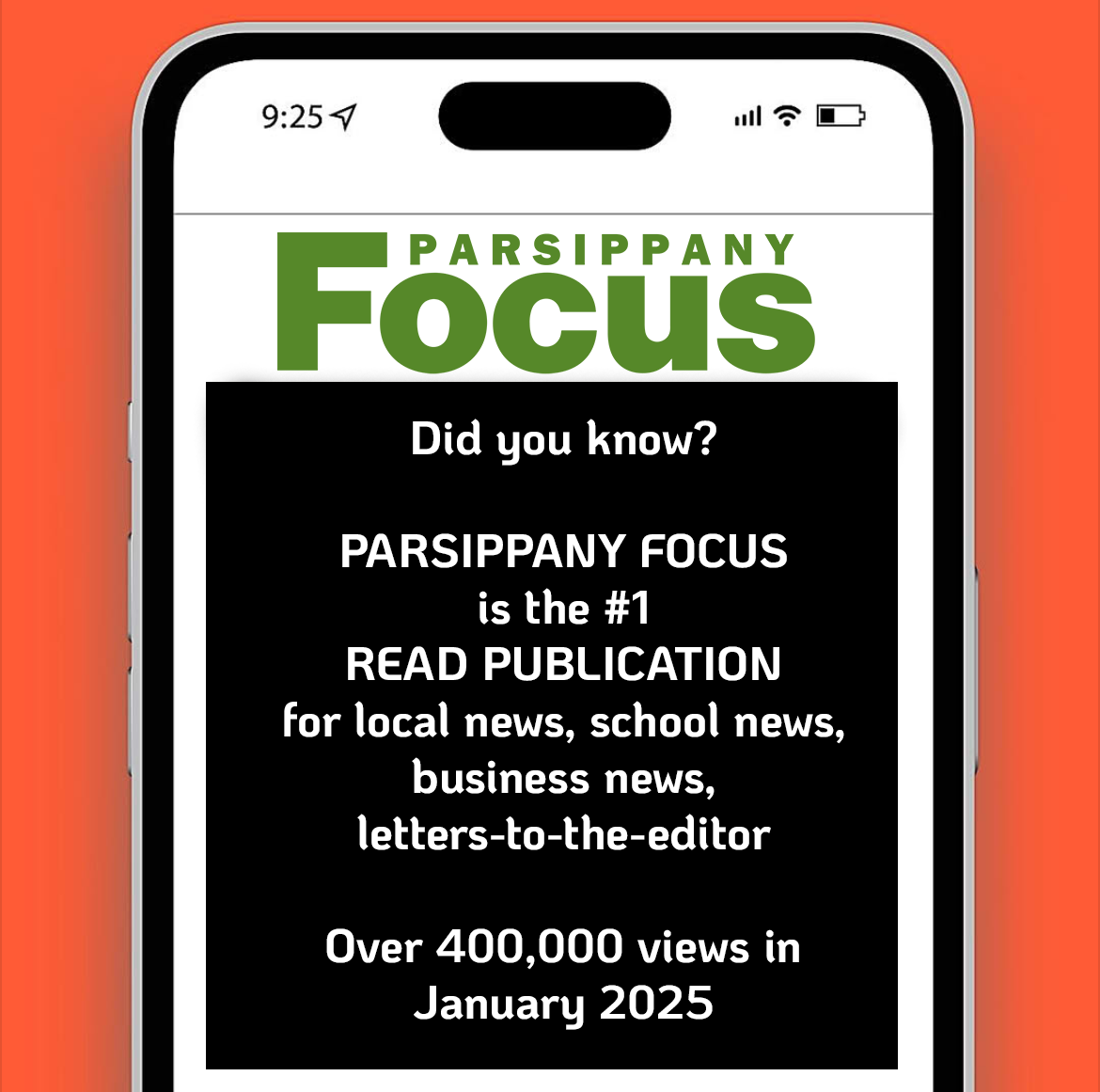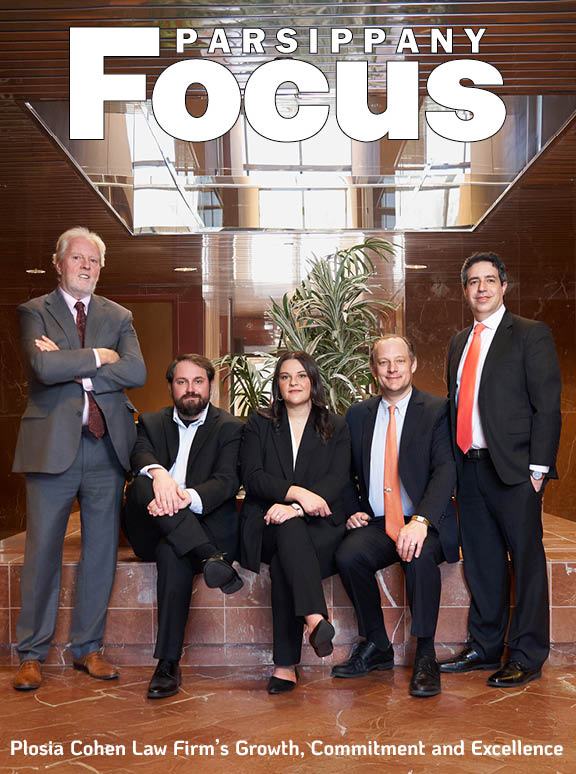 Dear Editor:
Dear Editor:
This letter was forwarded to Mayor Soriano and the Parsippany Town Council
Before I begin, I would like to say that I support the Parsippany Police in particular and law enforcement in general. As a former Paramedic I have taken care of officers who have been shot and stabbed, further I have hung out with the Secret Service providing medical standby for a US Secretary of State. So, I don’t want to hear from anyone that I have anti-police bias when I’m done.
While I support the Police, I do not, repeat DO NOT support the Police State.
On the final day of the Constitutional Convention in 1787, when our Constitution was adopted, Americans gathered on the steps of Independence Hall to await the news of the government our founders had crafted. When they asked Benjamin Franklin, “What do we have, a republic or a monarchy?” Franklin replied, “A republic, if you can keep it.” The only way to “keep it” is to keep tabs on what Government does in our name.
As of November 15, Ring, a subdivision of Amazon, had 630 police partnerships for their Ring video doorbell. Parsippany is one of those departments, the MOU signed on June 13 by Parsippany-Troy Hills Police Chief Andrew Miller.
The system raises concerns over the video feed recorded by the doorbell and its camera being used by law enforcement for unwarranted surveillance and facial recognition searches, it can exacerbate racial discrimination, pose a serious threat to civil rights and liberties, especially for minority communities already targeted and surveilled by law enforcement. Of particular concern is that data collected can then be shared with other agencies, such as ICE or used to target protesters.
I might not be a minority community member, but I am a civic activist or protester and strongly believe in Freedom of Speech under the 1st Amendment. I have protested in Washington and Albany when I lived in NY, and have meet with both State and Federal legislators on various issues. As you all know I have come to Town Council meetings to address issues of concern, and I am sometimes pretty blunt about it. As a citizen and photographer, I have concerns with abuse of this technology.
There’s nothing wrong with the government seeking to do a better job of properly sharing legitimately acquired information for law enforcement investigations – indeed, that is one of the things that 9/11 tragically showed is very much needed. However, Federal fusion center guidelines encourage wholesale data collection and manipulation processes that threaten privacy. It will only be a matter of time before the Parsippany Police Department is asked to turn over video.
A federally sponsored anti-terrorism fusion center in Oregon assisted a taskforce monitoring protest groups organizing against a fossil fuel infrastructure project in the state. There was no violation of the law by these groups, but they were spied on anyway. That can happen here.
Ring threatens people’s privacy, as bystanders who’ve given no consent to have their personal data recorded, and there are security concerns because Ring cameras don’t use end-to-end encryption and can be hacked.
Police Departments who download video captured by homeowners’ Ring doorbell cameras can keep them forever and share them with whomever they’d like without providing evidence of a crime, Ring told a federal lawmaker.
Police can use Ring software to request up to 12 hours of video from anyone within half a square mile of a suspected crime scene, covering a 45-day time span. Ring told US Sen. Markey (MA) the minimum region for requesting footage is 0.025 square miles, in order to prevent police from targeting specific individuals. The maximum region is 0.5 square miles, in order to prevent broad blanketing. The maximum time frame of data police can ask for is 12 hours, and they can only get footage less than 45 days old. The cameras begin recording as soon as motion is detected.
Police are required to include a case number for the crime they are investigating, but not any other details or evidence related to the crime or their request. It’s not like law enforcement has ever fudged details to get information they want. Police requests can target footage from any of Ring’s cameras, including video recorded inside an owner’s home.
Sen. Markey said in a statement that Ring’s policies showed that the company had failed to enact basic safeguards to protect Americans’ privacy. The partnerships between Ring and police, and the terms of the agreements, have not been transparent to the general public. I have reviewed the MOU signed by Parsippany and it is very, very vague.
Amazon’s vice president of public policy, Brian Huseman, said it placed few restrictions on how police used or shared the videos offered up by homeowners. I wonder whether the Town has any restrictions? I have not seen any.
The company says:
Ring does not require law enforcement to delete materials shared through a video request after a certain period of time,”. Law enforcement departments set their own terms for record retention in accordance with the laws of their jurisdiction and can keep it as long as they see fit. I know of no deletion policy by the Town, or any use policy at all.
Amazon and Ring also do not have any minimum-security requirements for the use of user footage. Partners use their own “requirements, protocols, and security measures” for protecting any Ring data they acquire. They can share it with whomever they like: “If videos are downloaded by law enforcement, Ring does not require police departments to agree to additional restrictions.”
Further, respecting users and non-user’s privacy is the camera owner’s problem, per Amazon. While Ring says it sets terms around how and when it will share that footage with police, anything the police do with it afterward is entirely out of its hands. So, Ring is saying if there are any problems or abuse, it is the homeowner or the PD that is to be held accountable, not them.
Ring’s privacy policy says it does not knowingly collect personal information from anyone under the age of 13. But the cameras, of course, collect footage of whoever happens to be nearby. “Ring has no way to know or verify that a child has come within range of a device,” Amazon wrote. “Customers own and control their video recordings.” That is not really true since Law Enforcement can access video with any legal process that complies w/ State or Federal law, bypassing the homeowner, per Ring.
Ring itself seems to have no compunction about showing children under 13 in footage if it’s good for their marketing. For example: 15.8 million Ring doorbells rang in the 24 hours of Halloween, the company said in a blog post.
The website Mashable asked Ring whether parents consented to their children’s appearance in the advertisement video, but the company did not respond. Wonder why?
An article in BuzzFeed pointed out earlier this year Ring’s terms of service that states:
You hereby grant Ring and its licensees an unlimited, irrevocable, fully paid and royalty-free, perpetual, worldwide right to reuse, distribute, store, delete, translate, copy, modify, display, sell, create derivative works from and otherwise exploit such Shared Content for any purpose and in any media formats in any media channels without compensation to you.
Sen Markey pressed Ring several times about the use of facial-recognition technology. The company responded that it does not use any facial recognition yet but may do so in the future. It will.
Face recognition data can be prone to error, which can implicate people for crimes they haven’t committed. Facial recognition software is particularly bad at recognizing African Americans and other ethnic minorities, women, and young people, often misidentifying or failing to identify them, disparately impacting certain groups. Not only is this a concern with the possibility of misidentifying someone and leading to wrongful convictions, it can also be very damaging to our society by being abused by law enforcement for things like the constant surveillance of the public. Additionally, face recognition has been used to target people engaging in protected speech.
Ring online postings further suggest that they are hiring Ukrainians to view and tag videos of Americans.
Ring, has crafted plans to use facial recognition software and its ever-expanding network of home security cameras to create AI-enabled neighborhood “watch lists,” according to internal documents reviewed by The Intercept. The planning materials envision a seamless system whereby a Ring owner would be automatically alerted when an individual deemed “suspicious” was captured in their camera’s frame, something described as a “suspicious activity prompt.”
It’s unclear who would have access to these neighborhood watch lists, if implemented, or how exactly they would be compiled, but the documents refer repeatedly to law enforcement, and Ring has forged partnerships with police departments throughout the U.S., raising the possibility that the lists could be used to aid local authorities, including Parsippany. The documents indicate that the lists would be available in Ring’s Neighbors app, through which Ring camera owners discuss potential porch and garage security threats with others nearby.
According to the Ring documents reviewed by The Intercept, which have not been previously reported, the company planned a string of potentially invasive new surveillance features for its product line, of which the facial recognition-based watch-list system is one part.
In addition to the facial watch lists, Ring has also worked on a so-called suspicious activity prompt feature that would alert users via in-app phone notification when a “suspicious” individual appears near their properties video feeds. In one document, this feature is illustrated with a mockup of a screen in the Neighbors app, showing a shabbily dressed man walking past a Ring owner’s garage-mounted camera. “Suspicious Activity Suspected,” warns the app. “This person appears to be acting suspicious. We suggest alerting your neighbors.” The app then offers a large “Notify Neighbors” button. The document leaves how exactly “suspicious” is defined a mystery.
Amazon, like Google and Facebook, have a poor history of guarding people’s privacy, and every instinct to hoard and monetize data for their benefit. According to a research report “Facial Recognition Market” by Component, the facial recognition industry is expected to grow $3.2 billion in 2019 to $7.0 billion by 2024 in the U.S.
Another potentially invasive feature referenced in the Ring documents is the addition of a “proactive suspect matching” feature, described in a manner that strongly suggests the ability to automatically identify people suspected of criminal behavior — again, whether by police, Ring customers, or both is unclear — based on algorithmically monitored home surveillance footage.
Big Brother in George Orwell’s novel Nineteen Eighty-Four is ostensibly the leader of Oceania, in the society that Orwell describes, every citizen is under constant surveillance by the authorities. The people are constantly reminded of this by the slogan “Big Brother is watching you”: a maxim that is ubiquitously on display. We are taking a step closer to this dystopian future.
Now I don’t begrudge the Parsippany PD the tools to do its job, but I worry that there is no oversight or checks and balances to curb abuse at the Federal, State, or Local level.
In conclusion while I love my country, I don’t trust my Government. Government, like the tech companies, have a poor history guarding people’s privacy and civil liberties, and Government has long history of spying on the citizenry, especially since 9/11. All I can do is keep tabs on you, my local elected officials, to see you protect us from abuse. If you can or will remains to be seen. Lastly, I hope this letter meets the Mayor’s metric on well researched questions and commentary.
Thanks, and have a great day.
Brian T. Tappen














